Diversifying your income as an artist is HUGE for growing your business.
Not only that, it's key to help you avoid burnout! Trust me, I know from experience. In this post, I interview Emily Jeffords on how teaching workshops and retreats has allowed her to scale her creative business!
Before we dive in, I want to tell you about a special free training I'm offering. If you're interested in creating and teaching in-person workshops or online courses, but you have no idea what to teach, who your audience would be, and how to make it profitable, this training has got you covered! Check it out here!
DISCLAIMER: I've included below my affiliate link to Emily's new course. That means that if you purchase using this link, I’ll receive a small commission at no extra cost to you. And you can trust that I FULLY endorse Emily's work. These kind of partnerships help support my work so that I can continue to share free resources on this podcast. Thank you for the support!
Emily Jeffords is a fine artist and educator with a recent collection launched with Anthropologie and a new online course called Making Art Work (Check it out! Enrollment closes 2/25/20). She's taught workshops and retreats all over the globe and is just a wonderfully talented artist and business woman. If you haven't heard of her (where have you been?! lol), she is incredible. Her work is so, so different from mine, but her drive, tenacity, and her business knowledge and savvy is something that has always inspired me. And we definitely have a lot in common when it comes to teaching and running businesses.
We had an amazing conversation about diversifying your income as an artist and how you can scale your business through teaching workshops, retreats, and online courses in a very profitable and easy way. Be sure to listen to the episode for the full interview!
Tell us a bit about you and your story.
Emily: (03:02) I'm so happy to be here. Thank you, Jenna. I am a fine artist. Most of my viewers and my audience know me for my oil paintings. Most of my collectors, that's what they want from me and that's what I love to create so that's good. Oil landscape paintings, oil florals in the past, but I haven't done those for awhile. But my recent kind of personal project I love is more abstract work and more like very nature-inspired, expressive, lyrical pieces that make me very happy. Along with being a fine artist, I'm also an educator, so it's kinda like the juggle of both business models and both parts of my brain and all of those things, which you get totally, Jenna.
So I teach a lot of creative entrepreneurs how to not starve, how to thrive, how to have sustainable businesses. And I love running workshops and retreats. So I kind of juggle both sides of my business in that way. And to me they are very separate. They're both creative and they're both my passions, but they're very much different entities and different parts of me.
How long have you been been in business?
Emily: (04:23) Yesterday was my 10 year anniversary! t's so crazy how, I mean, a decade ago I sold a painting for $1, which is absolutely not sustainable. It was this whole thing that I was doing where I sold a painting a day for the dollar amount of the day. So the first one was $1, the next one was two, three, four, you know, onward. Which is so unsustainable and clearly cause the moment I got pregnant with my second child, the whole thing crumbled. And I was like, well I can't paint anymore cause I have morning sickness and I have no business. So that's when I was like, this needs to change and this needs to evolve into something that can actually be profitable regardless of my energy.
Regardless of my ability to show up each day, I still have to provide for my family and support at least some small portion of our budget at that point, which obviously grew and now I support our family fully. But back then, I couldn't even depend on myself to make $400 a month. That was my goal. Like I can do it, I can make $400 bucks a month. So it's really cool to watch the progression that just 10 years… it's just been 10 years. It's insane. Like what are we going to do in the next 10 years? I'm in that head space right now if you can't tell… this emotional moment for me.
When did you start teaching workshops and did it help you generate more sustainable income?
Emily: (07:11) In 2013 I was kind of putting this place where I had to support our family. My husband, he was in the military. His job was cut and it wasn't like a severance package. We had no warning. It was literally like one day you have a job. The next day we have no budget. Like the whole military shutdown and you had no job. So it was shocking and not something we were ready for, not something we planned for.
Thankfully we had some savings but not a lot. So in that moment I was like, well, I can do this. I can support our family. I really just dove in and started painting like a mad woman, selling my paintings like crazy, making prints.
And then a few months into that process I began thinking, I love teaching. I love bringing people into my studio. I had a lovely studio space that has tall ceilings and lots of natural light and it's really pretty. So I thought I could just bring eight people into this space, let them see my studio and feel how it feels to be here and work alongside me.
I had just really small workshops at first that lasted for maybe like five hours, which is kind of a long time. But for oil painting, you need a nice chunk of time to get into it and really do it. That was my first experience teaching in my space with workshops. That was at the end of 2013.
By then like I had figured out how to support our family. We weren't making a ton of money, but we were living and I felt so empowered. Like I was doing it with my art. Like, what?! They don't teach you that in art at school. They don't tell you how to thrive in art school. They just teach you how to paint. So that was something that was so thrilling.
And then from there the workshops grew. I taught some online workshops. I eventually began teaching two-day workshops in my studio in 2014. And then in 2015 we began offering creative retreats because I wanted to see the vision of the workshops kind of expand into something that was much gentler and more immersive and more like a quieter space to step out of normal life, to let your mind relax for a minute and to let inspiration take over and then create.
And the work that you create in a workshop or at a retreat, it's probably not going to be your best work because you're in a head space that's not quite quiet enough to … like a fine artist really, it's a kind of a solo act. Like you're in your zone, you're zoning out everything else and you're just creating. So I really wanted to let the pressure go from creating a masterpiece at a workshop and just let inspiration fill you up and then you can go home and see how that inspiration affects you for the rest of your year, or your life in some cases. So that's where the retreats came in cause I wanted that whole body immersive long-term experience. The retreats are like at least three days, typically closer to five or six days.
We have two [coming up] in Italy in the fall and then one in Alaska in the summer.
What was that first workshop like?
Emily: (12:41) My audience size on Instagram I would say maybe 1200 maybe… under 2000, I believe. But Instagram was smaller and quieter back then… If it's one person or 10,000 people, it doesn't really matter as long as that person is paying attention, you're good. So they were paying attention at that point. And I think I had 8 people come to the workshop. I had this table set up in my studio. Not fancy. I mean I made it pretty with like flowers and covered the tables with paper and you know, put jars of paint brushes out. And it was sweet. It was like adorably, I dunno DIY, compared to today, but that's fine. You just get started. It's fine.
I was so nervous, though. I remember the day before just shaking in my boots literally. And then the morning of I'm like, I know how to paint. I can do this. I know how to paint. I can do this. I have the skills because yeah, you get up there and you're like, I'm the expert. Everyone listen to me and that just feels deeply uncomfortable for me…still to this day. So it was very much like, no, I'm here to share the way that I do things. This is a generous thing for me to do. I don't have to be the world's greatest painter. I can be Emily sharing how Emily does what she does.
Did you have any training as a teacher?
Emily: (14:30) Not on being a teacher. Gosh, no. I mean I paid attention in art school and I paid attention to how my teachers taught me but beyond that, no, of course not. So just kind of teaching what you know and that's why I liked that mindset shift of like, this is how I do it, this is what works for me. And I can share that all day long. I might not know the formulas for every style of everyone's method, but I can do my method and I can do my way and talk about that authentically. Your students just want the freedom to know that they have the permission to explore creativity in their own way. So me saying, I'm doing it in my way, let's them say, okay, I can do it in my way. I'm like, that's fine. Of course there are no rules. So I like that mindset shift.
What goes into planning those workshops abroad?
Emily: (16:24) Oh, so much. Logistics are intense. We've been doing workshops in Europe…We've done France, Spain, and now Italy coming up. I always work with a partner on the retreats abroad because the logistics are just insurmountable. Like for me, I would be crippled and I would do them poorly because it's a lot to manage. So I partner with someone that's really good at logistics and really good at planning. She's an event planner so that is kind of my cheat to get around that. And she also was a florist so we kind of split the responsibilities and the profits at the end because we both do so much work and it is a lot of logistics.
Finding a venue is super, super important. You spend a lot of time finding the venue and then visiting it in person because we found that a lot of venues look beautiful online, but then you get there, the soul of the building feels strong, which I know is like super woo woo. But you would understand if you walked into some of these villages that we've walked into and are like, someone's died here. Like something in this space feels so wrong. And when it feels right, you can calm everything else down and you can just settle in and feel at home there right away. But if it feels wrong, it's just deeply uncomfortable. That matters a lot to us. We spend a lot of time finding the right venue, visiting the venues.
And then it's just a lot of logistical issues like renting cars, finding a chef, finding rentals for tables and things. And oftentimes in France and Spain, we've had a really good English speaker connection—someone that speaks the local language and speaks English super well because we both know French and Spanish a little bit, but not nearly enough to communicate about medical issues or communicate about some contract that didn't follow through. Like, no, no, no, I know how to order pizza and go to the bathroom.
And for Italy that's also super important because we do not know Italian. So this is all new for us. So we try to find someone that either can come with us from America that knows the language or someone there that can kind of be our liaison to help us with all the logistics. So that's another important part, especially if you don't know the language. And then it's just a matter of like arriving and making it feel the right way, like having the right vibe and all the things have to feel the right way. Getting flowers, getting decorations and decluttering each of them. We rent some big homes and usually they just have too much clutter. So we're like hide this, hide this and make it feel and look a certain way.
My job is just to hide the mess so that you can have a beautiful time. I'm going to hide messes all day long so that my guests can just relax and not think about it. And usually our guests are women who are in the mother phase of life or just out of that, between 28 and 55 which is our usual demographic for these retreats. A lot of times their normal life feels so busy and everything is dependent on them. They can't stop, they can't take a moment. They do the dishes, they do the laundry, they do all the events, everything. They come to a retreat and you just have everything done for you. The first couple of days are kind of like, can I help you guys? Could I…And we're like, no! You're here to be on a retreat. Go let your mind do what it should be doing right now. And by the end, they're just like big marshmallows who are like unable to do anything for themselves anymore. And it's the best thing in the world. That's what I wanted you to do, to leave actually relaxed.
These retreats are very different than your workshops.
Emily: (21:06) For those [smaller workshops], like I didn't have a chef, I didn't have a partner. We didn't have flowers dripping from all areas of the building. It was so manageable. And because of that, my profit margins were higher because it was very much in my wheelhouse, in my space. I bought food from Whole Foods for the brunch. It wasn't fancy. It was just accessible for both them and for me. And the price point was lower for them, you know?
And honestly, it's just as beautiful. That's just as beautiful because the demographic that I can serve with the retreats is a different demographic than ones that will come to my workshops in my studio where it costs a 10th of the price of the retreat ticket.
Tell us more about your new 12-week online course.
Emily: (22:36) This course is very different from the retreats and from the workshops where I'm teaching people how to paint, how to find inspiration, how to like translate that inspiration into their own work. And a lot of times the retreat person isn't even a creative entrepreneur—they're just someone that wants to experience creativity and experience time away.
Whereas the online course Making Art Work is most certainly for a creative entrepreneur who wants to take their business from either zero to wherever or maybe they're in their third or fourth year or they're in their 10th year, but not finding the success that they used to. They're really the person that wants to up-level their business.
And it's, it's honestly a business course. It's not really even a creative course, although I do have an artist's heart and I bring everything back to the fact that if you are not feeling the passion and the beauty of what you're doing, your audience is going to find it stale and boring. And we talk specifically about how to market and how to sell creative work, how to sell artwork, how to sell, you know, the things that we create and that we love and that matter a lot to us.
So I feel like in that sense it's certainly specifically for artists and creatives and not for all businesses, but it's also not about creating better work. I assume that you already know how to do that when you come into the course. So yeah, it's intense. It's a lot of content in 12 weeks. We have a different module each week on topics like creating a sustainable business model with multiple revenue streams, having a nice profit margin, marketing 101 and 102, and email marketing and social media…
It's kind of like an MBA for artists. It's everything you didn't learn in art school, let's just put it that way.
Do you find that there's a limiting mindset around selling and marketing with creatives?
Emily: (27:10) I really do. And that's why we talk about marketing in the second module because I want to reframe that mindset as soon as possible.
The first module we talk about: What's your purpose? What's your goal? What's your mission? What's your highest work? Why are you here? And then right away I'm like, okay, now if you believe all those things, if you believe your work matters, and if you believe your work needs to be in the world, then for you to not share it with the world is very selfish and very hurtful to everyone around you.
As soon as they get that in their head and really believe it, then marketing is all of a sudden fun and enjoyable and they do a great job at it. But you do have to shift that mindset first. And I get it. Marketing feels weird unless you believe that… I get it. I mean, I felt that before myself.
Do you have any advice for those in the fear zone or imposter syndrome zone?
Emily: (30:45) Well I think the first thing is to wrap your mind around what you would like to teach. Like what does that feel like? What are you naturally gifted in? How will it feel to watch someone else come alive when you teach them that skill or that idea or that method or whatever?
I think the thing that is most easy to teach is a thing that comes most naturally to you, which can often feel like, Oh, everyone gets this. Like, I don't need to teach this. They all understand like they know what they're doing already cause I know what I'm doing already. That is so false.
And I still tell myself that all the time. I'm like, Oh, they know this by now, but they don't know it. Like I have to say it again and again and again because you're always helping someone else, someone new through the same thing that you feel like you're so… Like it's so second nature to you, but it's not to the person you're teaching.
So just kind of identifying what would the parameters of your course or your workshop be and really narrow that down because you can niche down and talk about one small area of your whole world for quite a while, for 5 hours, for 10 hours, for a whole week if you'd like to… For a whole course if you'd like to. And letting it be a slow unraveling process is actually really generous for your student because if you overwhelm them, they shut down and they walk away feeling like, I can't do this or I don't want to do this, and that's never good. So let it be just one small idea or one skill or one subject matter that you love that feels so natural to you. And then you can obviously build on that from there. That's a really good place to start teaching at least.
Can you imagine your business or your life without teaching?
Emily: (33:15) No. No. Absolutely not. Because I would just be spending so much of my energy producing and producing and producing were I not teaching also. And I love producing. That brings me so much joy. Going back to what actually matters to me, my highest work is still creating art and selling that art. But alongside that, teaching gives me the freedom to not have to create art anymore, which is crazy. I never saw that coming. Never ever.
Where can people follow and find out more about you?
Emily: (36:23) My website is a great place and I actually have two sites and they're obviously linked together. All of my fine art practice is held at www.emilyjeffords.com. And then all of my education is at www.emilyjeffordslearn.com. And that includes the retreats, the workshops…
I didn't talk about Alaska at all, but we're going to Alaska in July. I am so excited about that one. And for that one I'm working with an artist that lives in Alaska, so that one I feel like I'm totally cheating because she knows the locations so well —that's her home. It's going to be a natural painting workshop as opposed to a retreat. It's going to be less meditative [than my other retreats] and more like skill-based. When you leave, you will know how to paint with raw pigment. And you're also finding your own lodging, whereas at the retreats you stay with us, we do everything together and it's very slow and beautiful and immersive. So a bit of a different flavor. They're very similar but a little bit different.
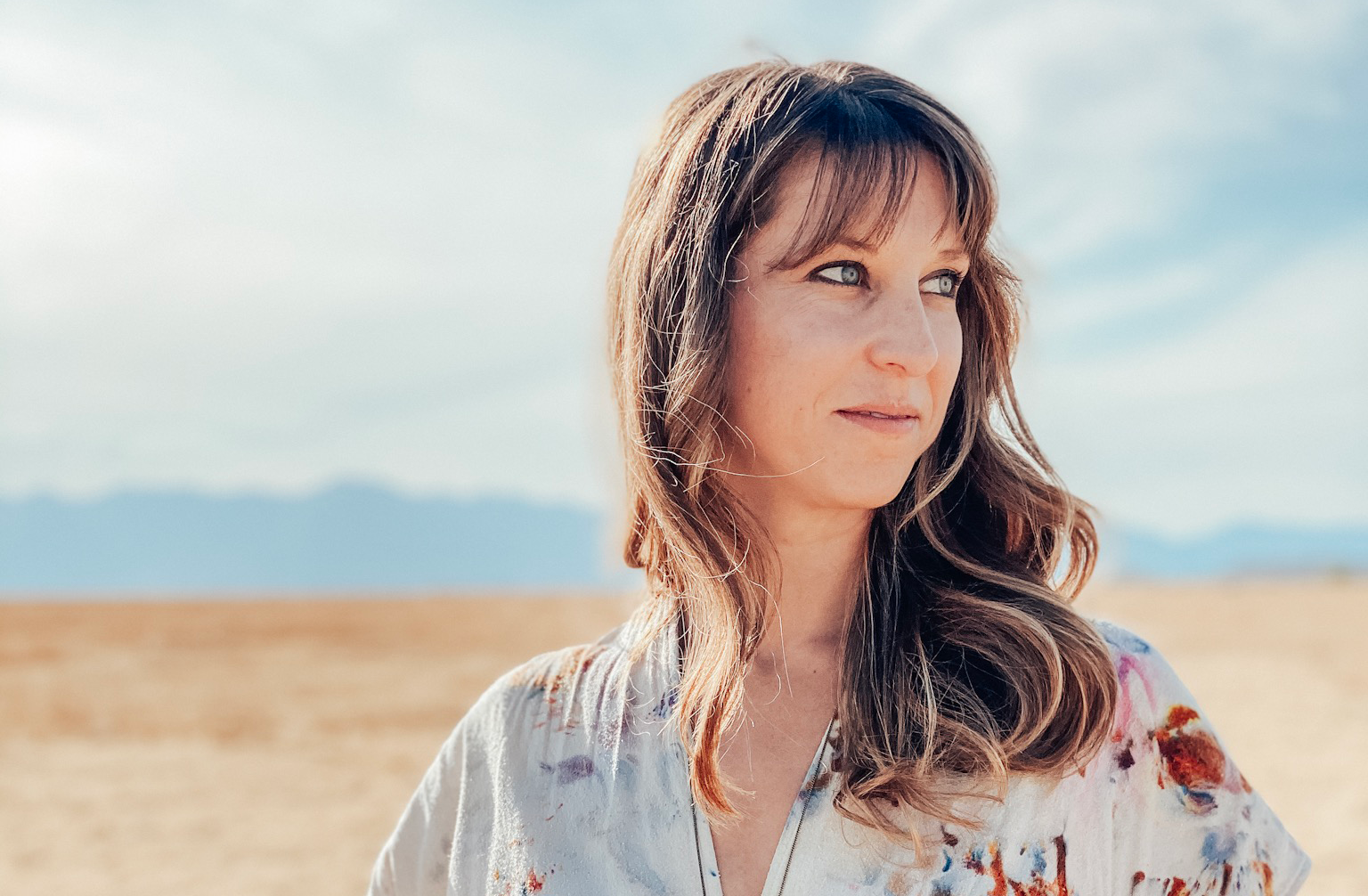
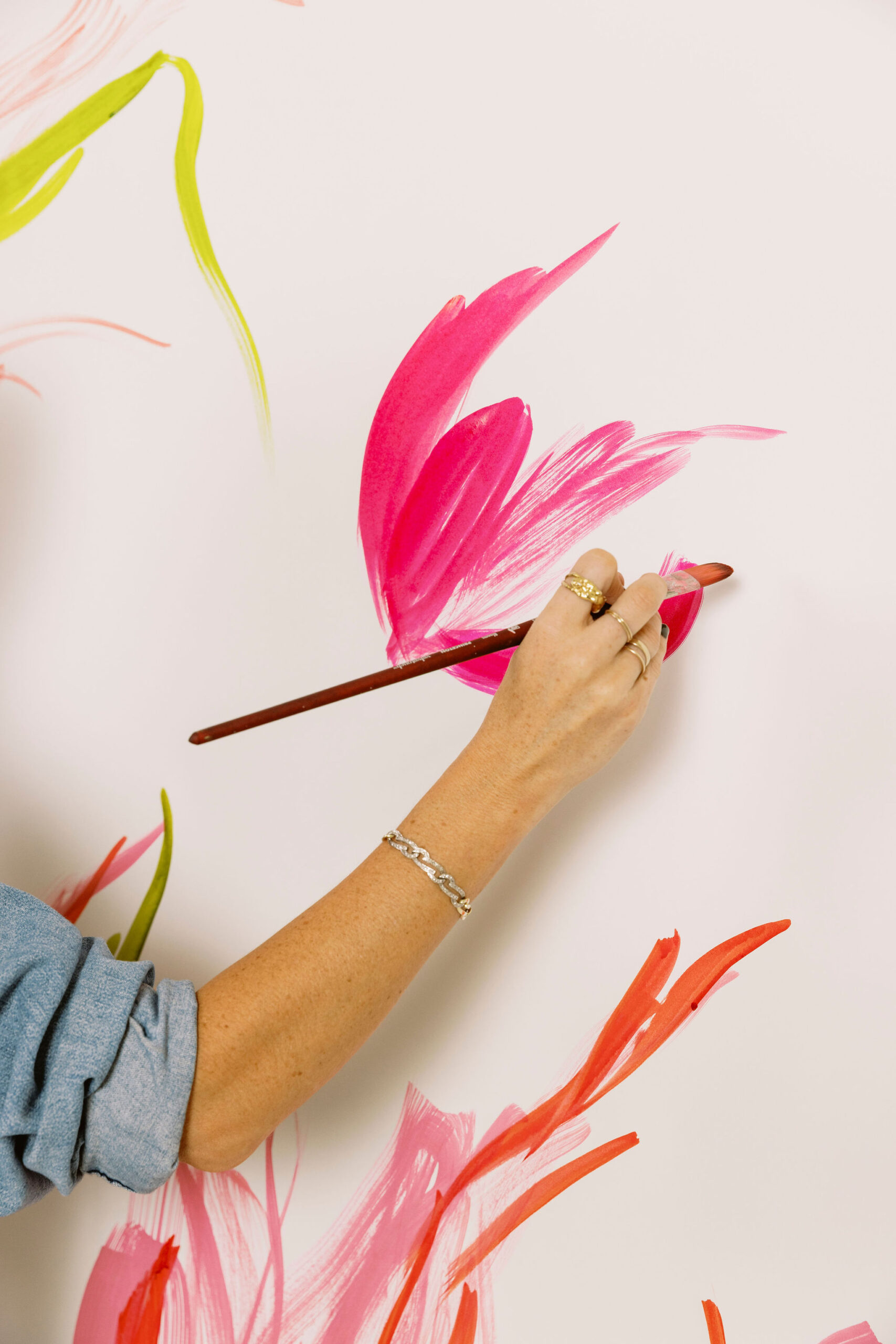
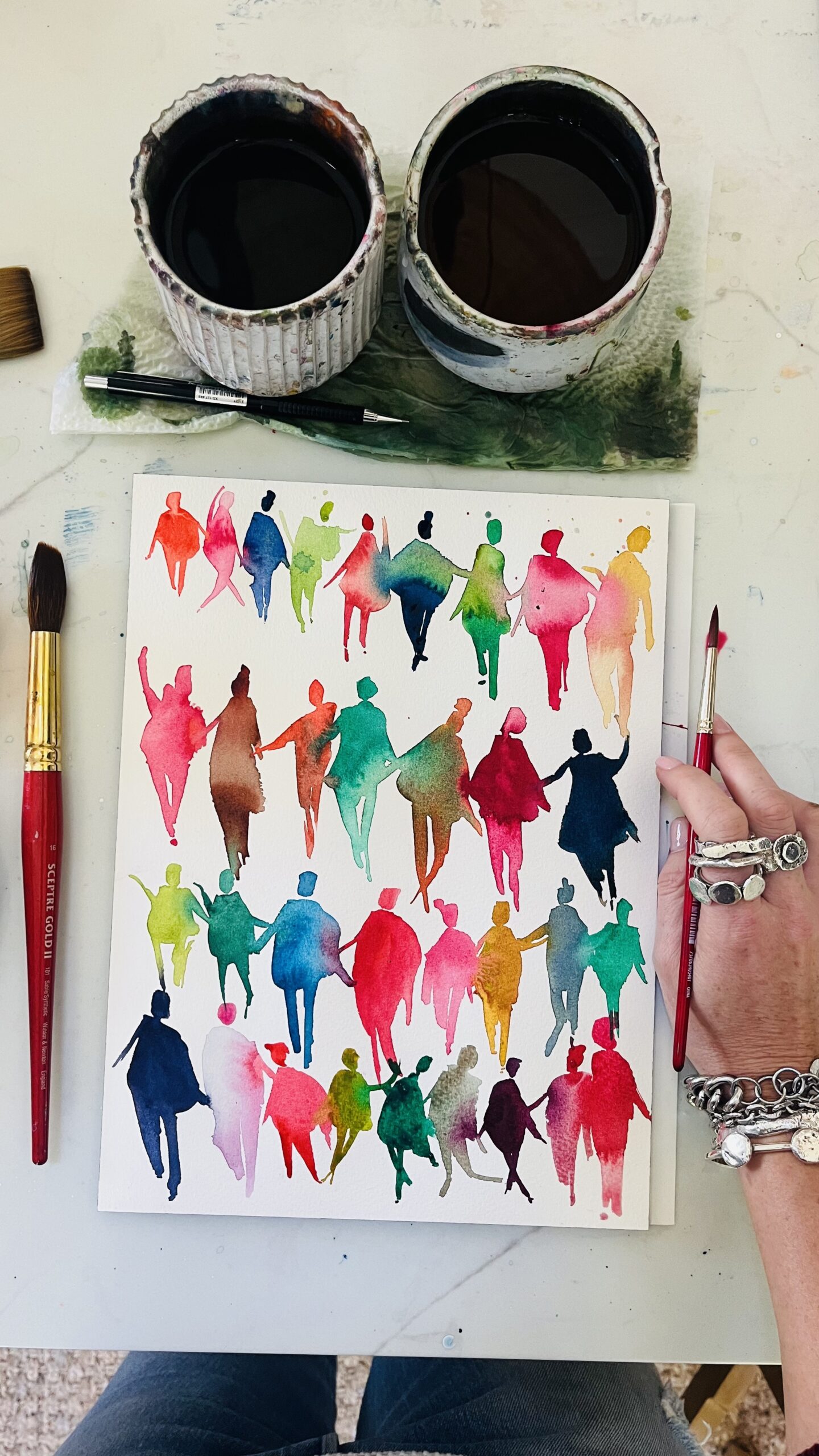
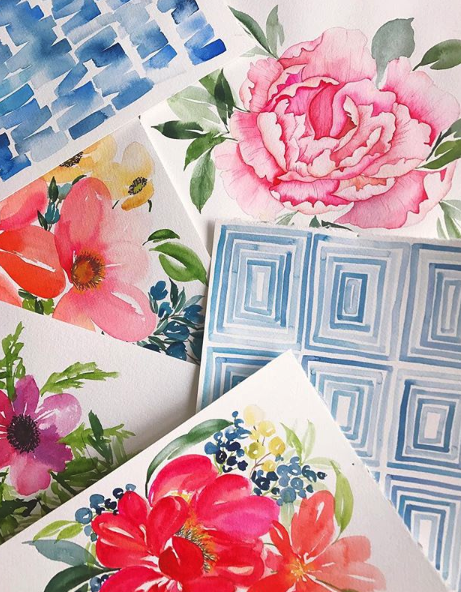
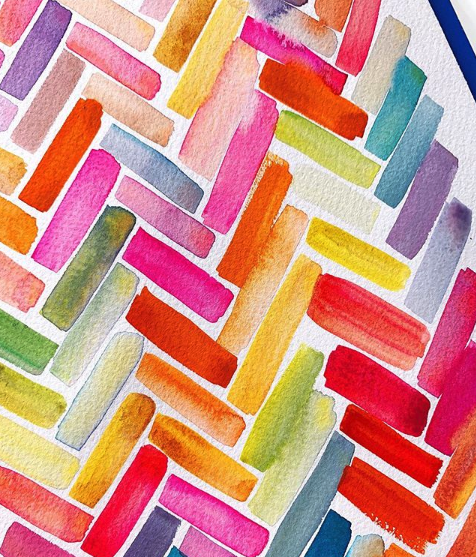
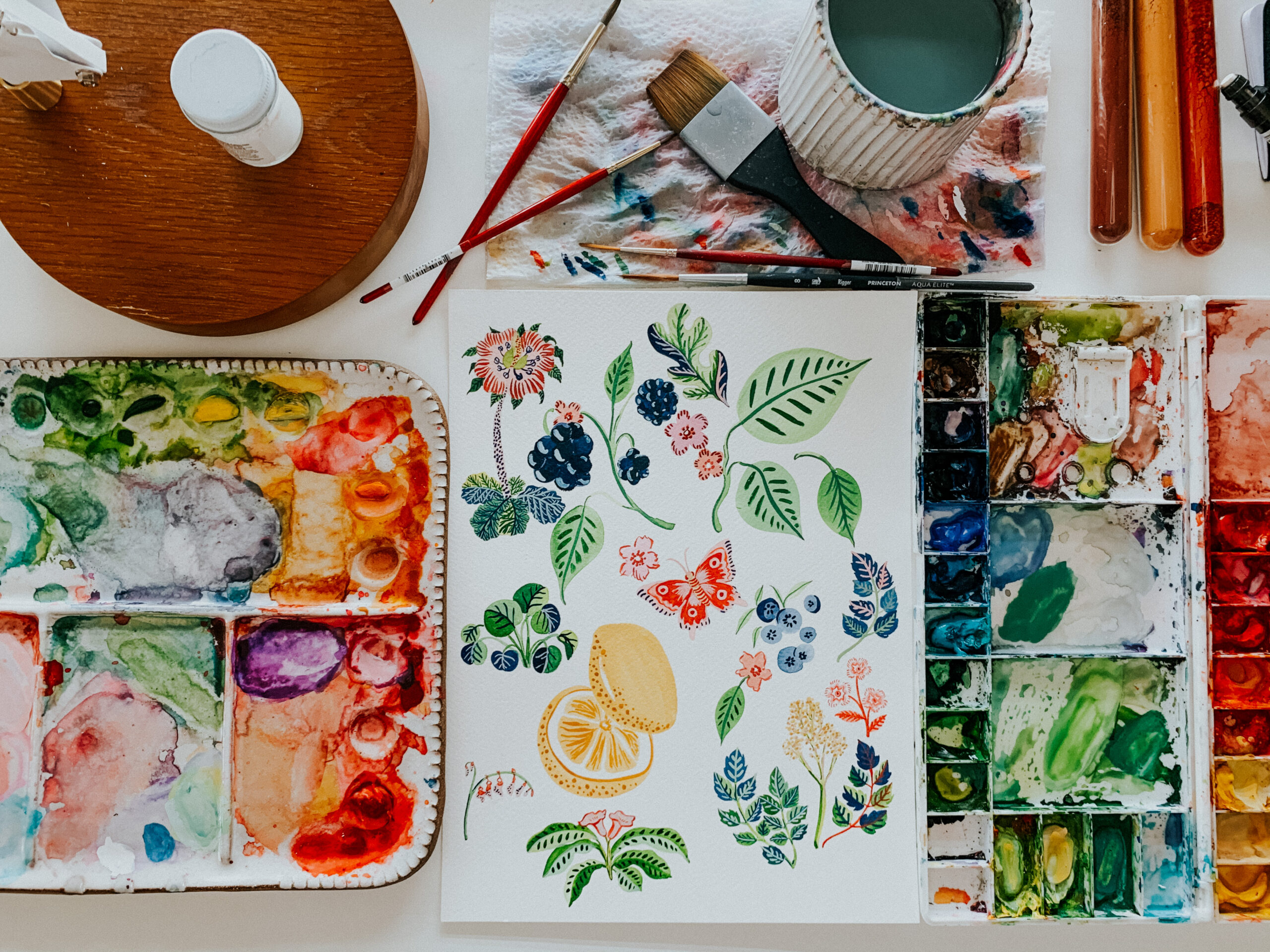
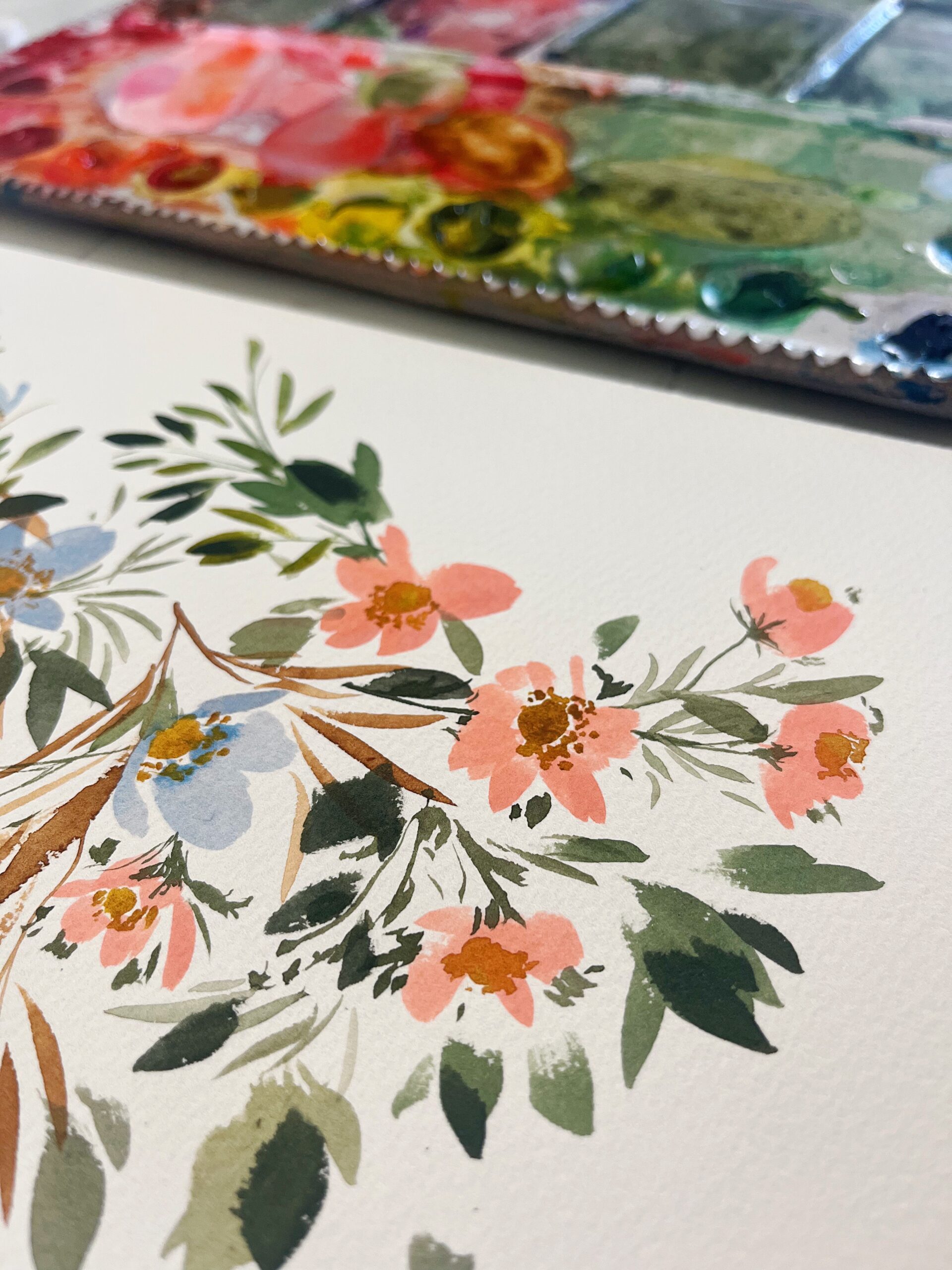
+ show Comments
- Hide Comments
add a comment